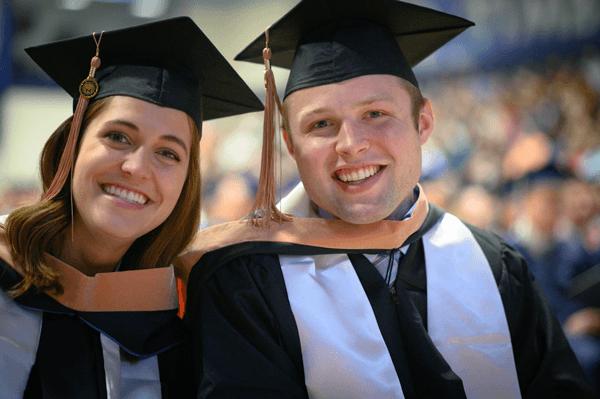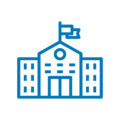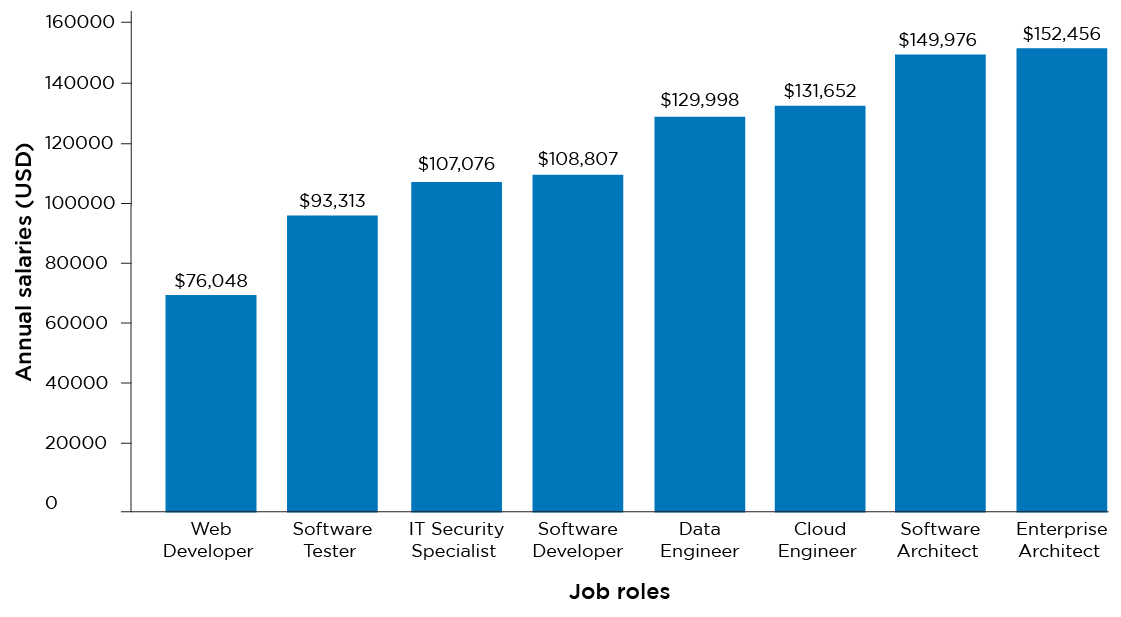Computer science is fast becoming a popular career path with the business world becoming increasingly reliant on technology and computers. Organizations around the globe are looking for professionals who have the technical skills, as well as the business skills. Northwood’s Bachelor of Science in Computer Science employs a distinct approach that includes technical know-how and business focus along with problem-solving skills that allow you to stand out in the market.
Northwood’s Bachelor of Science in Computer Science program is a STEM certified program for Optional Practical Training (OPT) purposes. This means that it offers the potential for international students to work in the US for a total of 3 years and the potential for a work visa (H1-B, etc.) This makes it the perfect platform to launch your career in computer science.
GET STARTED
Please register below to receive program brochure and connect with a program advisor.

CAREER OPPORTUNITIES
As the business world expands to use more and more technology and more evolved computers, computer science becomes more in demand, allowing for rewarding career opportunities. Here is a glimpse into a career in computer science:

THE NORTHWOOD DIFFERENCE
For over 60 years, Northwood University has prepared students to launch their careers successfully in their selected field. And our holistic approach develops the future leaders of a global free-enterprise society.
At Northwood, you will start classes in your major on your first day. This means you can validate your interest in a major field of study early and be prepared for internships after your first year. During your time at Northwood, you will;

CURRICULUM
The Bachelor of Science in Computer Science curriculum covers a comprehensive range of topics designed to provide students with a tool kit to navigate a business world dependent on computers and technology. The program covers a foundation in programming, algorithms, and data structures, providing you with a solid understanding of the building blocks of computer science and the skills to apply it in the real world.
The program will enable you to explore and gain hands-on experience to master several software, practices, and programming languages such as;
- FDN 1110 Student Success Seminar or FDN 2500 Strategies for Success — 1 credit hour
- FDN 1300 Student Leadership Seminar (campus only) — 1 credit hour
- FDN 2250 Blueprint for Success or FDN 3200 Career Advancement — 1 credit hour
General education courses are the foundation of the University’s outcomes and attributes for its graduates.
- ENG 1150 Composition I — 3 credit hours
- ENG 1200 Composition II — 3 credit hours
- MTH 1150 College Algebra or MTH 1100 Finite Math — 3 credit hours
- SPC 2050 Speech — 3 credit hours
- NSC 2100 Environmental Science or Natural Science — 3 credit hours
- HIS 2100 Foundations of the Modern World I or History Elective — 3 credit hours
- MTH 2310 Statistics I — 3 credit hours
- ACC 2410 Fundamentals of Financial Accounting — 3 credit hours
- ACC 2415 Fundamentals of Managerial Accounting — 3 credit hours
- ECN 2210 Principles of Microeconomics — 3 credit hours
- ECN 2220 Principles of Macroeconomics — 3 credit hours
- LAW 3000 Business Law I — 3 credit hours
- MGT 2300 Principles of Management — 3 credit hours
- MIS 1500 Business Productivity Software — 3 credit hours
- MKT 2080 Principles of Marketing — 3 credit hours
- FIN 3010 Financial Management — 3 credit hours
- MGT 4250 Organizational Behavior — 3 credit hours
- MGT 4800 Strategic Planning — 3 credit hours
- PHL 3100 Ethics — 3 credit hours
- ECN 4010 Economics of Public Policies — 3 credit hours
- PHL 4100 Philosophy of American Enterprise — 3 credit hours
- MIS 1110 Introduction to Management Information Systems — 3 credit hours
- CS 1100 Computer Architecture — 3 credit hours
- MIS 1300 Information Technology Infrastructure — 3 credit hours
- CYB 2300 Advanced Networking Systems — 3 credit hours
- MIS 2140 Programming I — 3 credit hours
- MTH 3100 Calculus I — 3 credit hours
- CS 2500 Data Structures and Algorithms — 3 credit hours
- MIS 2150 Programming II — 3 credit hours
- MTH 2870 Linear Algebra and Matrix Theory — 3 credit hours
- CS 3100 Computer Organization & Assembly Language — 3 credit hours
- CYB 2150 Scripting — 3 credit hours
- MIS 3400 Systems Analysis and Design — 3 credit hours
- MIS 3200 Database Design & Implementation — 3 credit hours
- MTH 3150 Data Science for Informed Decision Making — 3 credit hours
- CS 4000 Algorithm Design and Analysis — 3 credit hours
- CS 4100 Operating Systems — 3 credit hours
- MIS 4500 Technology Capstone Project — 3 credit hours
- Choice Elective — 3 credit hours
- Choice Elective — 1 credit hour
COMPUTER SCIENCE COURSES OFFERED
In this course, students are introduced to the fundamental concepts of computer science, problem solving, object-oriented algorithm development, and programming. Core concepts such as contemporary programming languages and their constructs, identifiers, primitive data types, etc. would be covered. Students will analyze declarative and imperative computer programs regarding function, logic, structure, and object-based approaches.
In this course, students learn about the internal architecture and organization of a computer system. It helps students understand the role that performance evaluation has in relation to computer system design, the design and architecture of instruction sets, the design and optimization of data paths, control design, pipeline implementations, etc. This course also provides an overview of digital logic.
In this course, students learn basic and essential topics in data structures, such as array-based lists, linked lists, skiplists, hash tables, recursion, binary trees, and sorting algorithms. Students also learn to use data structures as algorithmic tools to design efficient computer programs that will cope with complex applications through the analysis and design of fundamental data structures.
In this course, students will be introduced to the organization and operation of computer systems at the assembly language level. Students will perform mapping of statements and constructs in a high-level language on top of sequences of machine instructions. Internal representations of simple data types and structures will also be analyzed and mapped by students. Practical application of concepts presented in class will be provided by hands-on programming experience with an assembly language.
Prerequisite: CS 2150
In this course, students become acquainted with various techniques for designing algorithms, analyzing their time and space complexity, and demonstrating their correctness. This course also introduces the students to algorithm analysis, including tools such as computational models, case analysis, and computational complexity.
Prerequisite: CS 2500
In this course, students are introduced to the core concepts of operating systems, such as processes and threads, scheduling, synchronization, memory management, file systems, input and output device management, and security. Students will have to perform a general survey of operating system concepts and develop computer code and programs. Course concepts include synchronization of processes, inter-process communication, deadlock, multiprogramming and multiprocessing, scheduling, resource management, etc.
Prerequisite: CS 3100
In this course, students will have to work in teams to apply the knowledge they have gained from the curriculum. The project can be either an applied application or a theory-based project. Students choosing applied projects will identify a problem, develop a project proposal, identify an approach to the problem’s solution, develop the solution, and implement the solution, followed by testing or evaluating the solution. A theory-based project involves conducting original research (e.g., developing a new algorithm) and evaluating the strengths and limitations of the research (e.g., the new algorithm). And finally, it involves the students documenting their work in the form of written reports and oral presentations.

ADMISSION
APPLICATION PROCESS
The program follows a simple 3-step application process. The step-by-step process is outlined below.
STEP 1: SUBMIT APPLICATION
Candidates can apply to the program online and attach all required materials as outlined in the requirements below.
STEP 2: ROLLING ADMISSION
The admissions team will assess your application as soon as it is received.
STEP 3: INTERVIEW
Candidates might be required to give an interview before being accepted into the program. Once all the requirements are completed, the admissions team will notify you with a decision.
For admissions support, we offer online office hours, an admissions checklist, and email and phone support to answer your questions.
APPLICATION REQUIREMENTS
Applicants for the undergraduate program are required to have:
- Passport ID page (must be valid for at least 6 months beyond the entry date to Northwood University)
- Secondary school transcripts
- Secondary school completion certificate or diploma
- College or university transcripts (if you have completed any university credits)
- English proficiency
KEY DATES
- Please Note: Application fee is refunded only in the case an applicant is not offered admission to the program.
OPTIONAL PRACTICAL TRAINING – US OPT
After you have completed at least one year of your studies in the U.S. you will be eligible to participate in the US OPT (Optional Practical Training) program for F-1 students upon the completion of your undergraduate degree, allowing you to stay in the US while you start your career in computer science.
Optional Practical Training (OPT) is temporary employment in the US that is directly related to an F-1 student’s major area of study. Eligible students can apply to receive up to 12 months of OPT employment authorization before completing their academic studies (pre-completion) and/or after completing their academic studies (post-completion). Please click here to know more about OPT.
Northwood’s Bachelor of Science in Computer Science program is a STEM (Science, Technology, Engineering, and Mathematics) certified program for Optional Practical Training (OPT) purposes. This allows the graduates of the program to apply for an additional 24 months of extension of OPT. Ultimately, it offers the potential for international students to work in the US for a total of 3 years and the potential for a work visa (H1-B, etc.)

TUITION & SCHOLARSHIPS
TUITION AND FEES
The following figures are fixed 2025-2026 costs for 12-17 credit hours per semester.
| Expense Description | 1st Semester (Fall) | 2nd Semester (Spring) | Total Per Year |
|---|---|---|---|
| Tuition* | 1st Semester (Fall): $17,100 | 2nd Semester (Spring): $17,100 | Total Per Year: |
| Student and Technology Fee | 1st Semester (Fall): $850 | 2nd Semester (Spring): $850 | Total Per Year: $1700 |
*The fee does not include transport expenses, health insurance, any associated visa fees etc. and accommodation. It also does not cover any other expenses that are not expressly mentioned above. Students are required to live on campus for the first two years of attendance at Northwood University.
Healthcare plan is mandatory and is available for approximately USD $1,500*/year (*Subject to change per academic year).
SCHOLARSHIPS
The aim of the scholarships is to provide outstanding candidates with an opportunity to study irrespective of their financial circumstances. The program offers significant scholarship funding to the most talented applicants.
All applicants for the Bachelor of Science in Computer Science program are automatically considered for Northwood University scholarships. Scholarship amounts will be noted in your letter of acceptance.

PROGRAM EXPERIENCE
With a large international presence both at our U.S. locations and abroad, the Northwood student body is very diverse. Our alumni are at ease in complex, multi-cultural business environments with a professional network around the world. Learning at Northwood takes place in more than just the classroom. With a multitude of activities to choose from, students realize significant personal and professional growth which, after graduation, will set them apart as they launch their careers.
CAMPUS LIFE

Be it academic-based organizations like the Entrepreneurship Society, Collegiate DECA or Business Professionals of America (BPA) to Greek Life to service-based organizations like Circle K, Rotaract, the Student Athletic Advisory Council or Student Government Association, Northwood University has ways for students to be engaged and involved on campus and in the local community. These experiences help students learn first-hand, how businesses and people connect through shared experiences.
PROFESSIONAL DEVELOPMENT

Northwood students graduate with a superior business education that gives them a foundation of understanding free markets, entrepreneurial endeavors, personal responsibility, and ethical behavior. And, NU students also graduate with the ability to effectively communicate their ideas, beliefs, and experiences in an effort to promote success in their own lives and in the lives of others. Through workshops and campus-life programming, students hone networking, interviewing and résumé writing skills putting them one more step ahead in a competitive job market.
EXPERIENTIAL LEARNING

One hallmark of the Northwood education is hands-on, experiential learning. Many of our academic programs enhance classroom learning with large-scale, active learning student-run projects. These events allow our students to apply what they learn in the classroom to real situations.
ENTERPRISE/ENTREPRENEURIAL ORIENTATION

Many Northwood alumni earn their livelihoods in enterprises they own in whole or in part. While we offer a program in entrepreneurship, our entire curriculum is focused on enterprise models and entrepreneurial achievements. Enterprise is a key tenet of our Mission, and we believe entrepreneurship is the essential element of our free market economy.
COMPETITIVE ADVANTAGE

While our student-athletes are competing on the athletic fields as part of the NCAA Division II Great Lakes Intercollegiate Athletic Conference (GLIAC); many of our students also compete in academic arenas. Our national champion Mock Trial team has bested teams from Harvard, Georgetown, and Stanford while our Competitive Speech team, American Marketing Association, BPA, DECA, and American Advertising Federation student chapters regularly place in regional and national competitions.

ABOUT NORTHWOOD
On March 23, 1959, two young men with an idea, a goal, and a pragmatic philosophy to encompass it all, broke away from their careers in a traditional college structure to create a new concept in education.
Their visionary idea became a reality when Dr. Arthur E. Turner and Dr. R. Gary Stauffer enrolled 100 students at Northwood Institute. They envisioned a new type of university – one where the teaching of management led the way. While the frontiers of space were revealing their mysteries, Stauffer and Turner understood all endeavors – technical, manufacturing, marketing, retail, every type of business – needed state-of-the-art, ethics-driven management.
Time has validated the success of what these two young educators called "The Northwood Idea" – incorporating the lessons of the American free-enterprise society into the college classroom.
The University grew and matured; Northwood went from being an Institute to an accredited University, the DeVos Graduate School of Management was created and then expanded; the Adult Degree Program and its program centers expanded to over 20 locations in eight states; international program centers were formed in Malaysia, People's Republic of China, Sri Lanka, and Switzerland; and significant construction like the campus Student Life Centers added value to the Northwood students' experience. New endeavors such as Aftermarket Studies, entertainment and sports management and fashion merchandising, along with a campus partnership in Montreux, Switzerland, demonstrate an enriched experience for all our students.
Northwood University educates managers and entrepreneurs – highly skilled and ethical leaders. With more than 65,000 alumni and a vibrant future ahead, The Northwood Idea is thriving.
NORTHWOOD FACTS
|
18+ |
athletic teams |
|
31% |
of Northwood graduates own some or all of their business |
|
$13m |
in scholarships available |
|
40+ |
clubs, fraternities and sororities |
|
82% |
of graduates employed full-time or accepted to graduate programs (as per our most recent graduate survey) |
18+
athletic teams
31%
of Northwood graduates own some or all of their business
$13m
in scholarships available
40+
clubs, fraternities and sororities
82%
of graduates employed full-time or accepted to graduate programs (as of our most recent graduate survey)

ACCREDITATIONS, APPROVALS, AND MEMBERSHIPS
Northwood University believes it has a responsibility to its students and the industries and communities it serves to provide the highest standard of educational excellence possible. One measure of how well an educational institution meets this responsibility is in its accreditations and approvals by outside education associations and governmental interests. Because each Northwood location is served, at least partially, by different governmental agencies and academic accrediting bodies, and because all have been in existence for varying lengths of time, the accreditations and approvals may vary from one location to another.
ALL NORTHWOOD UNIVERSITY CAMPUSES/LOCATIONS HAVE THE FOLLOWING ACCREDITATIONS AND APPROVALS:
- Northwood University is accredited by the Higher Learning Commission (www.hlcommission.org). For more information, please click here.
- Northwood University business degree programs have business specialty accreditation from the Accreditation Council for Business Schools and Programs (ACBSP), (www.acbsp.org).
- The United States Department of Homeland Security (DHS) certified school for nonimmigrant foreign students (Fvisa); Citizenship and Immigration Services (USCIS)/ Immigration and Customs Enforcement (ICE); and Student and Exchange Visitor Program (SEVP) as a higher education institution for international students.
- Respective state offices for Veterans Administration programs as a higher education institution for degree-seeking qualified veterans and dependents.
- The U.S. Bureau of Internal Revenue as a tax-exempt institution as provided for in Section 501 (c) (3) and other applicable parts of the Internal Revenue Code for higher education organizations.
NORTHWOOD UNIVERSITY MEMBERSHIPS ARE REPRESENTED IN SUCH EDUCATIONAL AND PROFESSIONAL ORGANIZATIONS AS:
- American Accounting Association
- American Advertising Federation
- American Association of Collegiate and Admissions Officers Registrars
- American Certified Fraud Examiners
- American College Health Association
- American College Personnel Association
- American Hotel and Lodging Association
- American Institute of Certified Public Accountants
- American Library Association
- American Management Association
- American Marketing Association
- American Marketing League Association
- American Payroll Association
- American Taxation Association
- Association for Communications Technology Professionals in Higher Education
- Association for Higher Education and Disability
- Association for Leadership Educators
- Association for the Tutoring Profession
- Association of College and Research Libraries
- Association of College and University Housing Officers International
- Association of College and University Telecommunications Administrators
- Association of Professional Researchers for Advancement
- Association of University Programs in Health Administration
- Association of Veterans Educators Certifying Officials
- Automotive Aftermarket Industry Association
- College and University Personnel Association for Human Resources
- Council for the Advancement of Experiential Learning
- Council for Higher Education Accreditation
- Council for Hotel and Restaurant and Institutional Education
- Data Processing Management Association
- Educause
- Family Enterprise Research Scholars
- Family Firm Institute
- Global Consortium of Entrepreneurship Centers
- Intercollegiate Press Association
- International Assembly for Collegiate Business Education
- International Council on Hotel, Restaurant & Institutional Education
- International Leadership Association
- Mathematical Association of America
- Motor and Equipment Manufacturing Association
- National Academic Advising Association
- National Advertising Federation
- National Association for Campus Activities
- National Association for College Admission Counseling
- National Association for Developmental Education
- National Association of College Admissions Counselors
- National Association of College Auxiliary Services
- National Association of College Stores (through its bookstore provider)
- National Association of College and University Business Officers
- National Association of Colleges and Employers
- National Association of Educational Buyers
- National Association of Independent Colleges and Universities
- National Association of Intercollegiate Athletics
- National Association of International Educators
- National Association of Graduate Admissions Professionals
- National Association of College and University Mail Services
- National Association of Student Financial Aid Administrators
- National Association of Student Personnel Administrators
- National Association of Veterans Programs Administrators
- National Automobile Dealers Association
- National Collegiate Athletic Association
- National Collegiate Honors Council
- National College Learning Center Association
- National Cooperative Education Association
- National Council of Teachers of English
- National Council of Teachers of Mathematics
- National Council of Women of the United States
- National Association of Educational Buyers
- National Association of Independent Colleges and Universities
- National Association of Intercollegiate Athletics
- National Association of International Educators
- National Home Fashions League
- National Restaurant Association
- Newspaper Association of America
- Organization of American Historians
- Photographers’ Association of America
- Society for College and University Planning
- Society for Human Resources
- Specialty Equipment Market Association
- The Fashion Group
- University Risk Management and Insurance Association



